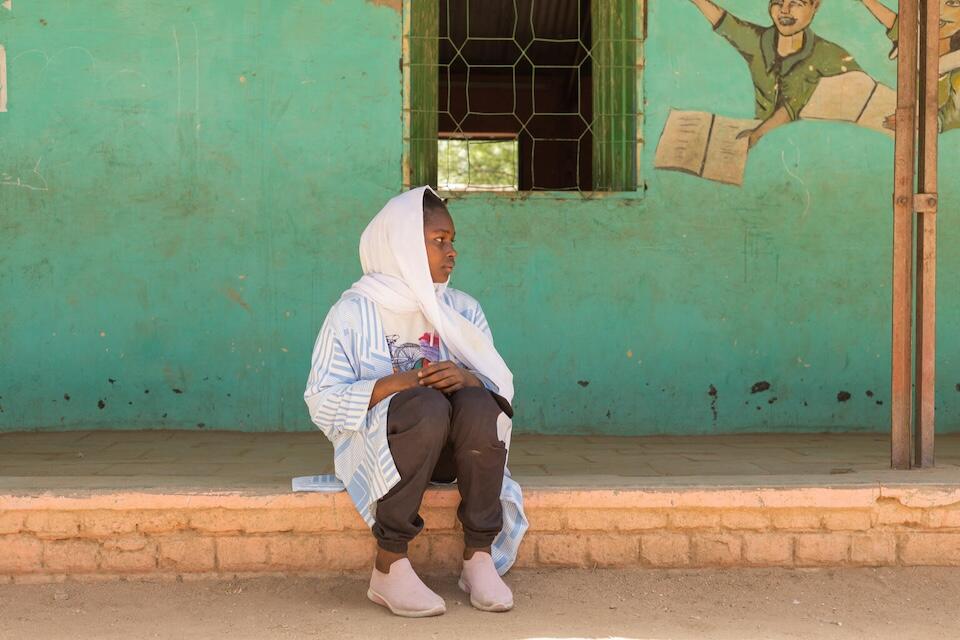
Education in Sudan: How War Destroyed It
Sudan Media Forum
Hasiba Suleiman, Khartoum, July 6, 2025, Sudan Reporters — On an ordinary morning before the war, Rehab, an eleven-year-old student from Khartoum, would wake her mother early to help prepare her carefully arranged school uniform and notebooks. Rehab dreamed of becoming a pediatrician and proudly wrote that dream at the top of her notebooks. But that morning no longer exists. Today, Rehab sleeps on the floor in a cramped displacement school in Wad Madani, without a school or books, holding an inkless pen and drawing silent shapes on her hand.
Rehab’s story is just one among millions left behind by Sudan’s recent war, as children watch their normal lives fade away — with education at the forefront. Thousands of schools have closed, and millions of students have dropped out, some still inside Sudan without the most basic learning resources, others scattered across neighboring countries without documentation or alternative education opportunities.
The catastrophe goes beyond destroyed buildings and unpaid salaries. It has robbed an entire generation of its simplest rights, with no organized intervention or urgent rescue plan in sight. Teachers themselves, whether displaced and dependent on aid or living under bombardment, struggle every day simply to stay alive before even thinking of fulfilling their educational mission.
Alarming Numbers
According to the latest UNICEF statistics (March 2025), nearly 17 million Sudanese children have been out of school for two years due to war and instability, in what the organization described as “a generation at risk.” UNICEF reported that about 90% of children of school age (approximately 19 million) now lack formal education. Its key summary states that one million children have been out of school since 2023, with around 19 million — about 90% of school-age — currently not receiving formal schooling.
These shocking figures confirm that Sudan is facing the worst education crisis in its modern history. Providing alternative education and psychosocial support has become an urgent necessity to avoid the total collapse of an entire generation’s future.
A Critical Question
This report tries to tell the stories of both students and teachers, reading the scale of the catastrophe through the numbers, and searching for an answer to the pressing question: What can be done now to save education in Sudan before it is too late?
First, Sudan Reporters posed its questions to Doria Mohamed Babiker, from the Executive Office of the Sudanese Teachers’ Committee, about the impact of the current war on students’ educational opportunities in various states, especially conflict areas.
A Longstanding Crisis with Structural Roots
Doria began by saying: before even talking about education under the war and the loss of students’ futures, it is necessary to acknowledge that education in Sudan has suffered from fundamental problems and structural imbalances since independence, which continued to deteriorate because it was never prioritized by the state, along with policies that systematically undermined it, whether political or economic.
She explained that government spending on education has never exceeded 1–2% of the state budget, leading to its gradual collapse until reaching today’s disaster, where the educational process has completely stopped in large parts of Sudan. Even in areas where schooling resumed, it was not up to standard, harming education quality and outcomes.
Students Out of School… Fuel for War
Doria pointed out that the war deprived thousands of pupils and students of their right to education, citing UNICEF reports that “more than 16 million students are now outside school walls.” Many of these, she added, became fuel for war, joining warring parties — either as mobilized forces with the army or within the Rapid Support Forces militias.
Destroyed Schools… Teachers Without Income
She added: “Schools were destroyed and turned into military barracks or gravesites, book warehouses were burned, and nearly 50% of students did not sit for their Sudanese certificate exams (2014–2025), especially in areas controlled by the Rapid Support Forces.”
Education as a Tool of Division
Doria stated that “education has become a tool for ethnic, tribal, and regional division, losing its character as a fair right available to everyone.” She referred to cases of student arrests, difficulty accessing exams, and the devastating psychological effects on students whose exam results were disappointing due to inhumane conditions and a lack of accountability for those responsible.
Warning of a Repeated Disaster
She warned against repeating last year’s tragedy as the 2024 class prepares for exams amid no guarantees, noting that three school-entry classes have accumulated in first grade, with millions falling back into illiteracy due to the collapse of education and the worsening economic situation.
A Call for a National Education Committee
The Sudanese Teachers’ Committee has called for forming an independent national committee to organize education, emphasizing that education in war, emergencies, and disasters requires special plans and coordinated efforts between the government, civil society, and international partners.
Teachers Facing Harsh Realities
As for teachers, Doria said: “Most of them are displaced or migrants, their salaries have stopped for over a year, they have lost their homes and belongings, and their current wages cannot cover even one day due to inflation and the collapse of the Sudanese pound.”
A Deadly Learning Environment
Doria Mohamed Babiker noted that the school environment is now unsafe, with war debris, unexploded ordnance, and human remains in some neighborhoods, as well as the danger of disease outbreaks with the rainy season approaching and no functional health centers after many hospitals went out of service.
Teachers Abroad… Dignity Shattered
For teachers outside Sudan, many have been forced to leave the profession and take on other work to meet their families’ needs. Some have faced displacement, arrest, or even death, further deepening the wounds of the education sector.
Students in Exile… At Risk of Dropping Out
In countries like Egypt, Libya, and Chad, Sudanese students face harsh challenges. In Egypt, for example, annual tuition per student ranges from 21,000 to 25,000 Egyptian pounds — about 500 US dollars — excluding daily living costs. This has forced some families to stop sending their children to school because of high fees. One parent told Sudan Reporters in deep distress: “It is an unbearable burden,” expressing the utter inability to afford their children’s schooling.
For example, the cost of taking middle-school certificate exams can reach 3,000 Egyptian pounds in Cairo, and up to 7,000 in Aswan, Luxor, or Alexandria, while families also struggle to secure residency papers for their children, threatening their continued education.
Schools Without Conscience… Stealing the Future
Perhaps the worst part is the absence of guarantees. Just weeks before Egypt’s high school exams, more than 1,500 students discovered they had no exam numbers despite their families paying large sums to private schools that promised to register them. The money vanished, and the academic year was lost without certificates or a backup plan, leaving families drowning in helplessness before their children’s tears.
“We are not asking for the impossible. We just want our children to study… to live like normal children,” one deeply distressed parent said.
A Crime Against a Whole Generation
In stories like these, failure is not just a statistic in a report, but a crime against a whole generation searching for a glimmer of hope in the darkness of a war that has stolen everything — even their childhood dreams. UNICEF’s biggest warning sums it up: “Sudan risks losing an entire generation if the world does not act now.”
--
The Sudan Media Forum and its member institutions are publishing this material, prepared by Sudan Reporters, to reflect the risks war poses to Sudan’s future — among the greatest of which is the collapse of the country’s compulsory education system, as UNICEF warns Sudan may lose an entire generation.


